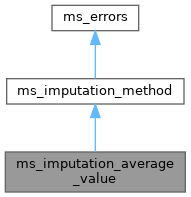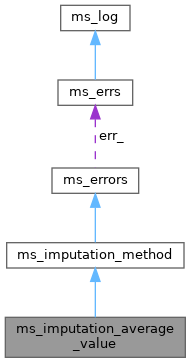#include <ms_imputation.hpp>


Public Member Functions | |
| void | appendErrors (const ms_errors &src) |
| Copies all errors from another instance and appends them at the end of own list. | |
| void | clearAllErrors () |
| Remove all errors from the current list of errors. | |
| void | copyFrom (const ms_errors *right) |
| Use this member to make a copy of another instance. | |
| std::vector< double > | getAverageValues () |
| Get the vector of average values, one average per variable, that will be written in place of all missing values. | |
| std::vector< std::vector< ms_imputation_missing_val > > & | getDataWithMissing () |
| Get the data array that the imputation method will impute. | |
| const ms_errs * | getErrorHandler () const |
| Retrive the error object using this function to get access to all errors and error parameters. | |
| int | getLastError () const |
| Return the error description of the last error that occurred. | |
| std::string | getLastErrorString () const |
| Return the error description of the last error that occurred. | |
| std::vector< std::vector< double > > | impute () override |
| Returns a 2D array of doubles with the calculated average value in place of missing values. | |
| bool | isValid () const |
| Call this function to determine if there have been any errors. | |
| void | setAverageValues (std::vector< double > averageValuesIn) |
| Set the vector of average values, one average per variable, that will be written in place of all missing values. | |
Protected Member Functions | |
| void | averageFindAverage () |
| Find average of each column. | |
| std::vector< std::vector< double > > | changems_imputation_missing_valArrayToDoubleArray (std::vector< std::vector< ms_imputation_missing_val > > dataProcess) |
| Extracts only the values from a 2d array of missing value objects. | |
| std::vector< double > | changems_imputation_missing_valVecToDoubleVec (std::vector< ms_imputation_missing_val > missingObservation) |
| Extracts only the values from a vector of missing value objects. | |
| std::vector< double > | getKnownValues (std::vector< ms_imputation_missing_val >) |
| Loop over one observation and get not missing values. | |
| std::vector< int > | getMissingIndexes (std::vector< ms_imputation_missing_val >) |
| Loop over one observation and get missing indexes. | |
| std::vector< std::vector< int > > | removeDuplicateIndexes (std::vector< std::vector< int > > duplicateIndexes) |
| The same combination of missing indexes can appear multiple times within a dataset. Duplicate indexes are removed from the missing indexes list to avoid making repeated alglib models. | |
| void | setDataWithMissing (const std::vector< std::vector< ms_imputation_missing_val > > &dataWithMissingIn) |
Average value imputation class inherits general imputation method class with average value specific properties and methods
A slightly more complex method of imputation than fixed value. The arithmetic mean of each variable is calculated then written in place missing observations for all observations of each variables.
For example the array of five observations of five variables with some missing observations marked with a "x":
0 1 2 3 4 0.3 1.3 2.3 3.3 4.3 0 x 2 x 4 x 1 x 3 x 0 x 2 x 4
Is imputed to:
0 1 2 3 4 0 1 2 3 4 0 1 2 3 4 0.1 1 2.1 3 4.1 0 1.1 2 3.1 4
Average value imputation class inherits general imputation method class with average value specific properties and methods To use average value impution, create an instance of the ms_imputation_average_value class, then create an instance of ms_imputation using ms_imputation_average_value in the constructor, finally call ms_imputation.impute(). For example, with a valid ms_ms1quantitation object, in C#: ms_imputation_average_value averageValueImputation = new ms_imputation_average_value(); ms_imputation Imputation = new ms_imputation(ms1Quant, ms_imputation_average_value, IMPUTATION_VARIABLE.IMPUTE_PEPTIDE_RATIO); VecVecdouble imputationRes = Imputation.impute()
|
inherited |
Copies all errors from another instance and appends them at the end of own list.
| src | The object to copy the errors across from. See Maintaining object references: two rules of thumb. |
|
inherited |
Remove all errors from the current list of errors.
The list of 'errors' can include fatal errors, warning messages, information messages and different levels of debugging messages.
All messages are accumulated into a list in this object, until clearAllErrors() is called.
See Error Handling.
|
inherited |
Use this member to make a copy of another instance.
| right | is the source to initialise from |
|
inherited |
Retrive the error object using this function to get access to all errors and error parameters.
See Error Handling.
|
inherited |
Return the error description of the last error that occurred.
All errors are accumulated into a list in this object, until clearAllErrors() is called. This function returns the last error that occurred.
See Error Handling.
|
inherited |
Return the error description of the last error that occurred.
All errors are accumulated into a list in this object, until clearAllErrors() is called. This function returns the last error that occurred.
See Error Handling.
|
overridevirtual |
Returns a 2D array of doubles with the calculated average value in place of missing values.
A slightly more complex method of imputation than fixed value. The arithmetic mean of each variable is calculated then written in place missing observations for all observations of each variables.
For example the array of five observations of five variables with some missing observations marked with a "x":
0 1 2 3 4 0.3 1.3 2.3 3.3 4.3 0 x 2 x 4 x 1 x 3 x 0 x 2 x 4
Is imputed to:
0 1 2 3 4 0 1 2 3 4 0 1 2 3 4 0.1 1 2.1 3 4.1 0 1.1 2 3.1 4
Implements ms_imputation_method.
|
inherited |
Call this function to determine if there have been any errors.
This will return true unless there have been any fatal errors.
See Error Handling.
|
protectedinherited |
Set the missing value array
| dataWithMissingIn | The array of missing values to be imputed |